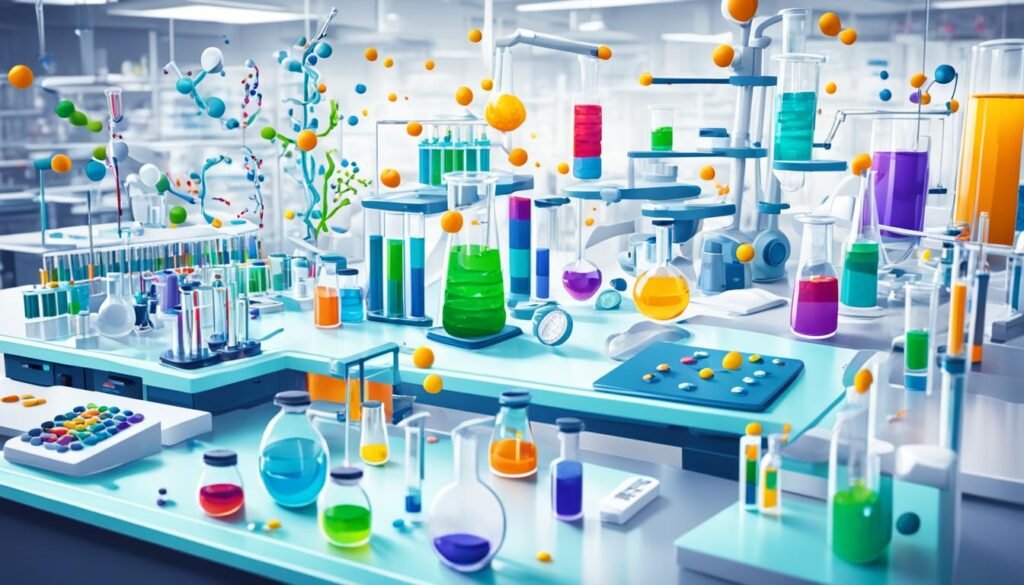Biotechnological innovation is becoming more important for global health improvement. Technology transfer plays a big role in creating treatments for diseases in the developing world. There’s a big gap between the developed and developing worlds in getting cheap medicines. This gap exists because the pharmaceutical industry mainly focuses on more profitable health areas.
The National Institutes of Health (NIH) is working hard to solve this issue. They’re looking into how to make their science more accessible to people in developing countries. They are reaching out to research centers, foundations, and companies in Latin America, Africa, Asia, and Eastern Europe to help with this.
Key Takeaways
- Biotechnology is recognized as a crucial tool for improving global health.
- Developing countries face challenges in accessing affordable medicines due to the pharmaceutical industry’s focus on profitable areas.
- The NIH is exploring ways to improve technology transfer to developing countries, including through partnerships with research institutions and companies.
- Addressing the disparity in access to biotechnology-derived therapies is a key priority.
- Identifying effective strategies for technology transfer could significantly impact healthcare in the developing world.
Biotechnology can help make affordable medicines more available to people in the developing world. The NIH is working on ways to do this. The future of global health could greatly improve with the help of biotechnology.
The Transformative Power of Biotechnology
In the late 20th century, scientists started using biology to create new healthcare technology. This method differs from traditional drugs by using living things’ complex systems to treat medical issues. It led to amazing new treatments and technologies that were once only in stories.
Revolutionizing Healthcare Through Innovation
The 1980s saw a big step forward with recombinant insulin. It was made by genetically changing Escherichia coli bacteria. This breakthrough gave millions of diabetics a safer and better insulin. It showed the power of biotech to change healthcare by offering new treatments and tests.
From Recombinant Proteins to Gene Editing
Biotechnology evolved from making recombinant proteins to recent gene editing achievements. This journey has brought us new ways to treat a variety of illnesses. It’s changing how we take care of health and manage diseases.
Monoclonal Antibodies: Precision Targeting
Monoclonal antibodies (mAbs) are a key part of modern health care. They are made to find and attach to certain molecules. This means they can kill only harmful cells, keeping healthy ones safe.
Herceptin: A Breakthrough in Breast Cancer Treatment
Herceptin is a great example of how mAbs work. It targets a protein found on some breast cancer cells. This treatment helps stop the cancer from getting worse without hurting normal cells.
Expanding Applications Beyond Oncology
Mabs are now used for more than just cancer. They help treat diseases like Alzheimer’s and autoimmune problems. This shows their potential for many health issues.
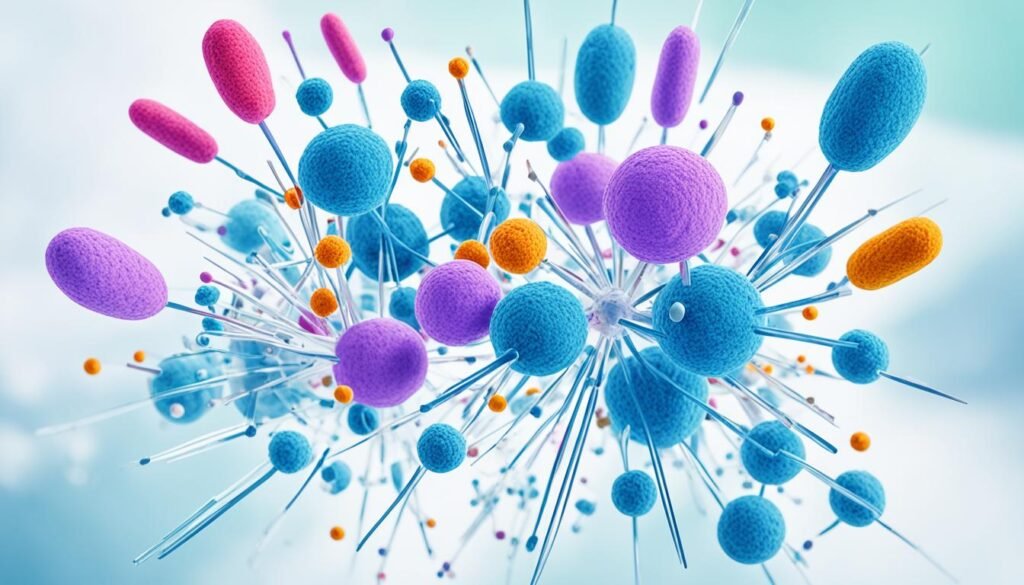
Genome Sequencing: Unlocking Personalized Medicine
Biotechnology advances have made genome sequencing more available and cheaper. The Human Genome Project finished early in 2003, mapping the entire human genetic code. This milestone opened the door to personalized medicine by finding genetic links to diseases.
The Impact of the Human Genome Project
The Human Genome Project’s completion changed genome sequencing forever. It gave researchers and doctors the ability to find genetic causes of many health issues. From cancer genomics to rare diseases, genetic data helps create treatments based on a person’s unique genes.
Illumina’s Role in Democratizing Genome Sequencing
Illumina is a standout in making genome sequencing accessible. Their technology allows quick and precise decoding of DNA. This is critical in various areas like cancer genomics and pharmacogenomics, ensuring treatments match a person’s genetic specifics.
Companies like Illumina have made next-generation sequencing more available. This breakthrough has fueled our understanding of the human genome’s impact on health. It’s key in moving forward with personalized medicine.
CRISPR: A Revolutionary Gene-Editing Tool
CRISPR–-Cas9 is a game-changer in biotech. It lets us change DNA with unmatched accuracy, solving genetic disorders and pushing biotech forward. This tech allows for precise gene editing, offering new hope in fighting genetic diseases.
Precision Editing for Genetic Diseases
CRISPR is shining in clinical tests. It aims to fix many genetic issues – from blood to cancer to blindness. This method is key in creating personalized and powerful treatments for many ailments.
Clinical Trials and Potential Applications
The use of CRISPR in medical tests is growing fast. It’s helping create new treatments for genetic diseases and cancer. As we keep improving gene editing, CRISPR could change how we fight diseases and create better medicine.
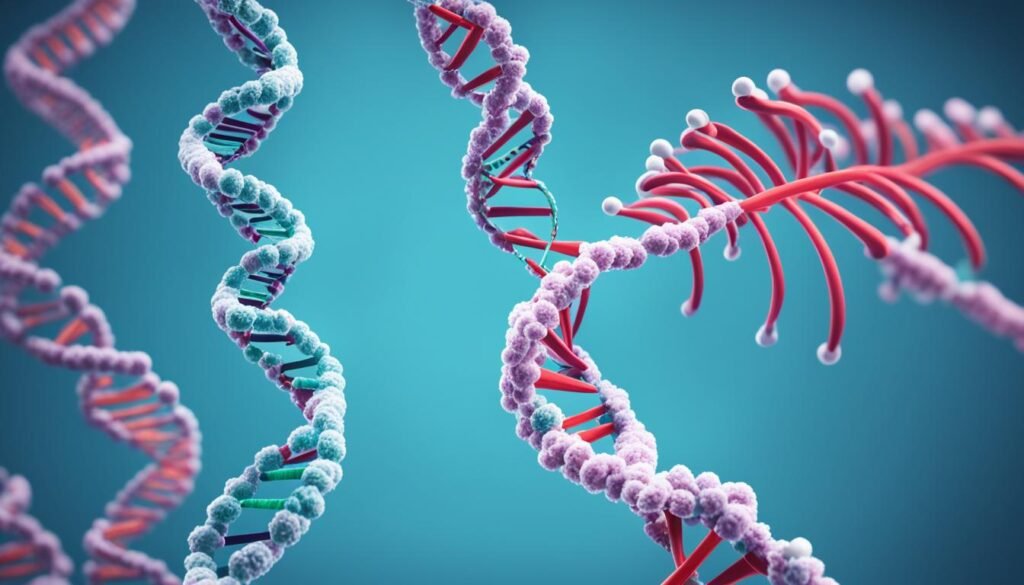
Biotechnology and Vaccine Development
Biotechnology has changed the game in making vaccines. The response to COVID-19 showed this. Pfizer and Moderna quickly created vaccines using a new mRNA approach. These vaccines open new doors for even quicker and personalized vaccines.
mRNA Vaccines: A Rapid Response to COVID-19
Pfizer and BioNTech’s COVID-19 vaccine got quick approval. This, together with Moderna’s work, proved how fast biotechnology can act in a global crisis. The fact that mRNA vaccines can swiftly adjust to new virus strains is a major strength.
Technology Transfer and Global Health
The NIH Office of Technology Transfer (OTT) is working to make transferring technologies easier. This is especially true for countries that are still developing. They focus on connecting with research institutions in Latin America, Africa, Asia, and Eastern Europe.
OTT has already started to share or is in talks to share technologies with several countries. These include India, Mexico, Brazil, China, Korea, Egypt, and South Africa. This shows that sharing early-stage biomedical technologies with other institutions is beneficial.
Partnering for Neglected Disease Therapies
The OTT aims to help solve the access gap for medicines for neglected diseases. These diseases hit developing countries hard. The NIH partners with these nations to help them create, make, and provide important treatments. This work helps level out health care access differences.
Building Capacity in Developing Nations
Besides transferring technology, the OTT helps build up health efforts in developing countries. They support programs that boost science and tech in these places. The goal is to make these nations able to deal with their own health issues. This supports making the world healthier for everyone.
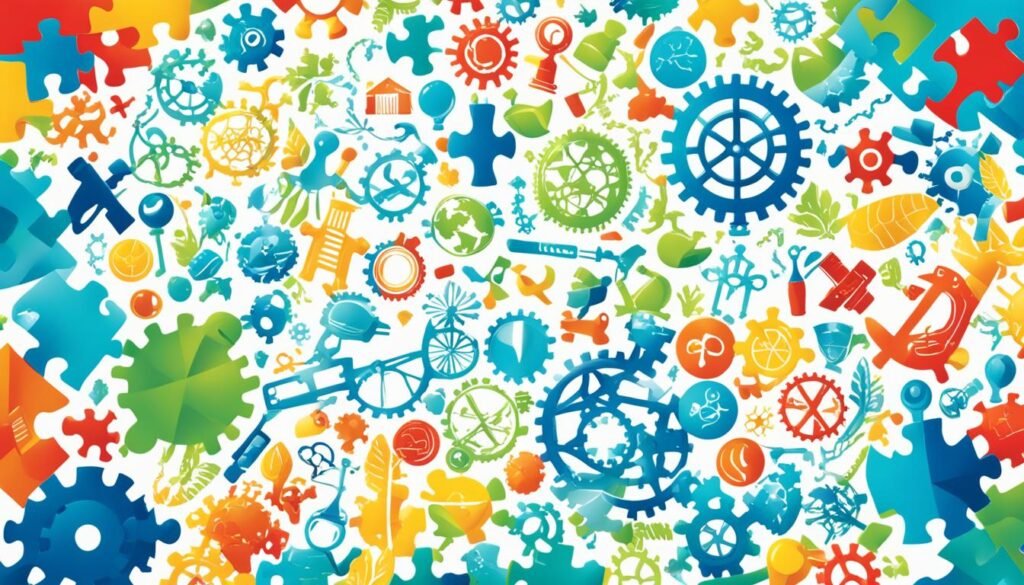
Biotechnology, precision medicine, disease treatment
Biotechnology products are changing how we treat diseases. They bring new ways to solve health problems and help patients more. These products let us make therapies that are just for one person. They use a patient’s genetic data to decide the best treatment. This kind of treatment is very precise, thanks to fields like pharmacogenomics, molecular diagnostics, biomarkers, and regenerative medicine.
Personalized Therapies for Targeted Disease Management
Genetic information and the science of living creatures are helping us find better ways to diagnose, treat, and stop diseases. Thanks to this, people’s futures look brighter all over the world. Biotechnology has changed healthcare by giving us treatments that fit a person’s unique genes and body. This level of personal care was hard to imagine before.
Leveraging Genetic Data for Precision Medicine
Fields like pharmacogenomics and molecular diagnostics have made it possible to create treatments that are aimed right at a disease. Doctors review a person’s genetic data to pick the best course of treatment. This can lower the chance of bad reactions and make good results more likely. Biotechnology is helping to make healthcare more personal and precise. The future of medicine looks very hopeful because of this.
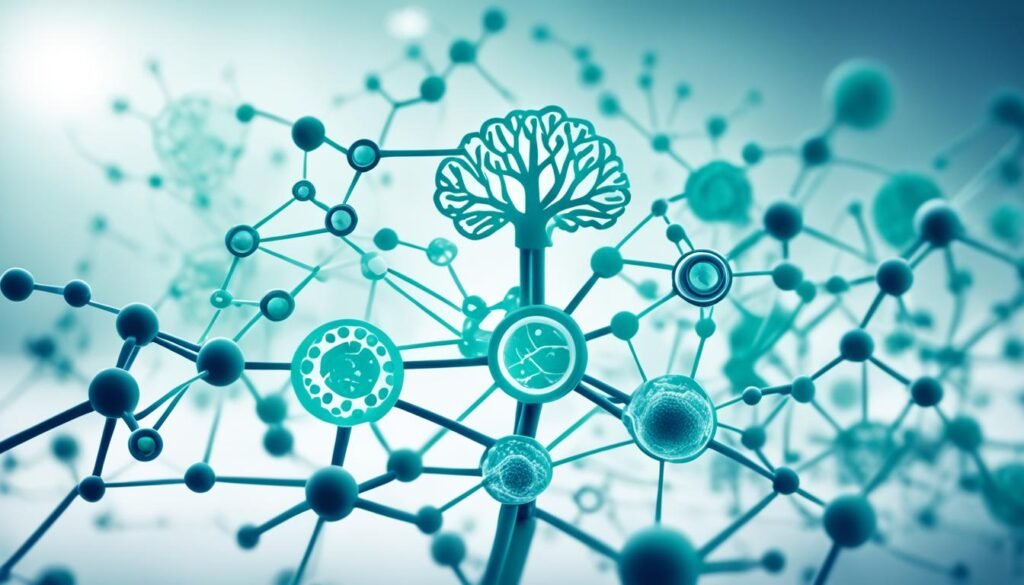
Biotech’s Impact on Food and Agriculture
Biotechnology is making big changes in farming and food. It has developed genetically modified crops. These crops are made to be better for us. They help by making food more nutritious, less likely to cause allergies, and better at fighting off diseases. This makes farming more sustainable. Biotech is also behind the creation of biofuels and plastics from plants. This is good because it uses less oil and helps the environment.
Enhancing Nutrition and Reducing Allergens
Biotechnology is making our food better. It’s creating genetically modified food that is more nutritious and less likely to cause allergies. Scientists are adding more vitamins and minerals to these foods. They’re also making changes to proteins to create food that is safe for everyone, even those with food allergies.
Sustainable Farming and Disease Resistance
Biotechnology is changing how we farm. It makes farming and food production more efficient and better for the planet. Biotech crops can fight off diseases on their own. This means farmers can use fewer chemicals. The result is farming that’s kinder to the environment and better in the long run.
Biotechnology also helps make biofuels and plant-based plastics. We need less oil thanks to these products. This is a step towards a more sustainable future.
| Biotechnology Application | Impact on Food and Agriculture |
|---|---|
| Genetically Modified Crops | Enhance nutrition, reduce allergens, improve disease resistance |
| Biofuel Production | Reduce reliance on petroleum-based fuels, lower environmental impact |
| Bio-based Plastics | Replace petroleum-derived plastics, promote sustainability |
Biotechnology and Sustainable Manufacturing
Biotechnology is making manufacturing cleaner and more efficient. It uses renewable resources to produce materials like plastics and fuels. This reduces the impact on the environment.
Bio-Based Plastics and Fuels
Bio-based plastics are now made from plants like corn instead of oil. This means they don’t add more carbon to the air. They’re a greener choice than plastics made from oil.
Biotechnology helps make biofuels, too. Biodiesel and ethanol come from farm leftovers and plant oils. They burn cleaner than fossil fuels, helping the planet.
Reducing Environmental Impact
The use of biotechnology in manufacturing lessens harm to the earth. It uses renewable resources and cuts waste. This lowers emissions and protects nature.
With bio-based plastics and biofuels, a circular economy forms. Things get reused or recycled, not just thrown away. This helps solve our environmental problems.
Veterinary Applications of Biotechnology
Biotechnology isn’t just changing human healthcare. It’s also making a big difference in the vet field. New biopharmaceuticals are making disease treatment better for animals. They include anti-inflammatory drugs for arthritis. There are also products to fight internal parasites, bacterial infections, and sedatives to calm animals for surgery.
Vet biotech is boosting animal health and making food safety better for us. With biotechnology, vets can give more targeted and effective treatments. This helps animals feel better and makes sure our food is safer.
Improving Animal Health and Food Safety
Biotechnology in the vet world is bringing new solutions for animal health. Anti-inflammatory drugs help with pain, and parasitic treatments keep pets and livestock parasite-free. These advances have really stepped up the care level for animals.
These vet biotech improvements aren’t just good for animals. They also make food safety better. By keeping farm animals healthy, biotech treatments lead to safer, better food products for people. So, it’s great for animals and us who eat their products.
| Veterinary Biotechnology Applications | Benefits |
|---|---|
| Anti-inflammatory Drugs | Improved treatment of arthritis and musculoskeletal pain in animals |
| Parasitic Treatments | Elimination of internal parasites in pets and livestock |
| Antibiotics | Effective treatment of bacterial infections in animals |
| Sedatives | Calming animals during anesthesia administration |
Ethical Considerations and Regulatory Landscape
The biotechnology industry is pushing into exciting new territories of innovation. But, it’s vital to look at the ethical and regulatory hurdles that spring up with these advances. Policymakers, involved people, and the public need to work together. They ensure biotechnologies’ cutting-edge journey is safe and responsible.
Balancing Innovation and Safety
New biotechnologies, including gene editing and personalized treatments, bring up tough ethical issues. Regulators aim to support new innovation while keeping people safe. They’re working to set up clear rules and checks that match technology’s quick changes.
Intellectual Property Rights and Access
Intellectual property rights around biotechnologies create their own set of problems. It’s key to protect the work of researchers and companies for future innovations. But, everyone should have a fair chance to use these medical breakthroughs. Leaders have to balance the need for new ideas with making these advances available to everyone.
The biotechnology world will keep getting more complicated. But, by talking openly, working together across fields, and focusing on responsible innovation, we can make the most of biotechnology. We can change lives and build a better future for the world.
Conclusion
Biotechnology is changing the healthcare world. It provides new ways to handle tough medical issues. It’s improving how we spot, treat, and prevent diseases. Technologies like personalized medicine and targeted therapies are making big differences for patients.
It goes further than health. Biotechnology is also shaking up farming and making manufacturing greener. As biotechnology grows, we need to keep a close eye on safety and making sure everyone can benefit.
Biotechnology’s power to boost global health and create sustainable solutions offers great promise. It points to a brighter, better future for us.
FAQ
What are the key innovations in biotechnology that are transforming healthcare?
Biotechnology has brought us new proteins and antibodies. It has also improved how we map genomes and edit genes, like with CRISPR. These changes have led to care that’s more personalized, treatments that target specific issues, and major steps forward in fighting various diseases.
How has biotechnology impacted vaccine development?
Biotechnology helped create the mRNA vaccines for COVID-19 from Pfizer and Moderna. These new vaccines show how quickly we can respond to health threats worldwide. They highlight the ability to make vaccines quicker and fit them to different needs.
What is the role of the NIH in technology transfer to developing countries?
The NIH works to boost how we share tech with countries that are developing. They aim to connect with groups and companies in Latin America, Africa, Asia, and Eastern Europe. This, in turn, helps to fight off both common and lesser-known diseases better.
How is biotechnology being used to make manufacturing processes more sustainable?
Biotechnology is helping to swap out oil with things like corn and plant oils for plastics and fuels. This change is making the making of these products less harmful to our planet. It’s a big step towards making our tomorrow cleaner and greener.
What are the ethical considerations and regulatory challenges surrounding biotechnology?
There’s a need to keep making new biotech while also making sure it’s safe and used in the right way. Policymakers and groups in the field must work out how to fairly use and get to these new bio-products. This matters a lot, especially for poorer places wanting to use these advancements.
Source Links
- https://www.ncbi.nlm.nih.gov/pmc/articles/PMC7125924/
- https://lifesciencesintelligence.com/features/unveiling-the-impact-of-biotechnology-breakthroughs-in-healthcare
- https://www.bio.org/articles/biotechnology-solutions-everyday-life
More : Ultra-Processed Foods: Uncovering the Hidden Dangers – All Media Trend





